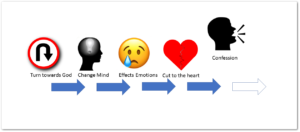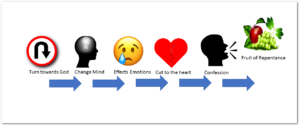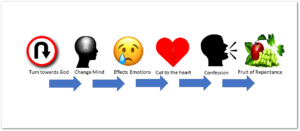Repentance

We get a better understanding of what repentance is when we combine the New Testament (metanoeó) meaning with that of the Old Testament (shub). Thus, repentance is a change of mind resulting in a change of direction; towards God.

About Turn
Repentance comes when we realise that we have rebelled against God’s authority, broken His laws, spoiled His creation, ignored the fact that He wants fellowship with us, provoked His anger and we deserve His judgement.

This will of course produce an emotional response of deep sorrow. This is very natural and it is what the Bible calls ‘a sorrow that God intended that results in repentance’ (2 Corinthians 7:9).
Now, the primary direction of repentance should be towards God.
However, there will, no doubt, be an element of sorrow or simply regret as to how our actions have had a negative effect on ourselves and others.
The apostle Paul is a good example of someone feeling convicted by his wrong actions towards others. In Acts 9:1 and Philippians 3:6, we see how he recalled persecuting the church.
Conviction of wrongdoing and sorrow don’t necessarily always lead to true repentance. Here are two examples; one from the Old Testament and another from the New Testament.
In 1 Kings chapter 21, we read about the dreadful actions of Ahab (and his wife Jezebel!). He wanted Naboth’s vineyard but he refused to sell it to Ahab. So, he and Jezebel conceived and then implemented a plan to get him falsely accused that he had cursed both God and the king and then had him stoned to death.
Ahab’s actions did not go unnoticed by God and through His servant, Elijah, Ahab was told that the consequences of his actions would be a gruesome end for both him and Jezebel and his whole family line would come to an end. On hearing this we read: “When Ahab heard these words, he tore his clothes, put on sackcloth and fasted. He lay in sackcloth and went around meekly (1 Kings 21:27). Ahab’s “repentant heart” did not last long and he soon went back to his wicked ways. In the following chapter (22), we read of Ahab’s death and how the dogs licked up his blood, just as Elijah had foretold.
In the New Testament we can observe how Judas Iscariot was full of sorrow for betraying Jesus. He even tried to return the thirty pieces of silver that he had been given for his betrayal and resorted to suicide by hanging himself to a tree. His body fell from the tree and his end was a similar gruesome one as Ahab’s was. (Matthew 27:3-5 & Acts 1:18).
From the Mind to the Heart
There will be a process involved in repentance that will move from thought, confession and then on to action or deeds (that demonstrate true repentance).

It is not just an intellectual change of mind; it needs to come from the heart.
The New Living Translation of Joel 2:13 puts it like this:
“Don’t tear your clothing in your grief,
but tear your hearts instead.”
David demonstrated this repentance from the heart in Psalm 51:17,
“My sacrifice, O God, is a broken spirit;
a broken and contrite heart you, God, will not despise.”
Rebellion Against God
The Bible states that: “We all, like sheep, have gone astray, each of us has turned to our own way; and the LORD has laid on him the iniquity of us all.” (Isaiah 53:6).
The latter part of this verse gives tremendous hope. It was written some 750 years before the birth of Christ but it is a hugely important prophecy pointing the way to how Jesus paid for our wrong doings at the cross.
But, before we can get to the cross, we need to address our sin. Here we clearly see, that all of us have rebelled and gone astray. That classic Sinatra song, sadly sung at so many funerals states ‘I did it my way’.
Another verse puts it like this: “”My people have committed two sins: They have forsaken me, the spring of living water, and have dug their own cisterns, broken cisterns that cannot hold water.” (Jeremiah 2:13).
This is God addressing two sins of His people and clearly the first one is that, we have chosen to live a life without any consideration towards God. Who, incidentally is actually the source of true ‘life’.
Secondly, we have not only ignored God, but we have tried to find satisfaction in life apart from Him, which will always prove fruitless and unfulfilling. It’s worth considering how so many of the rich and famous end up depressed, disillusioned and some result to suicide. We can even see a good example of the futility of ignoring God and leading a life of excess ‘pleasure’ from the Bible. Look at Solomon, who was one of the richest men who ever lived. He found out that all his riches, knowledge and excessive pleasure was ‘absolutely meaningless’.
The Means by Which Repentance Can Come.
Repentance is from God and as we read the Bible we can see some following ways, through which the Lord can bring about repentance in a person:
The Holy Spirit.
And when He (The Holy Spirit) has come, He will convict the world of sin, and of righteousness, and of judgement (John 16:8).
The Preaching of His Word.
When the people heard this, they were cut to the heart and said to Peter and the other apostles, “Brothers, what shall we do?” (Acts 2:37).
The Word of God
For the word of God is living and powerful, and sharper than any two-edged sword, piercing even to the division of soul and spirit, and of joints and marrow, and is a discerner of the thoughts and intents of the heart (Hebrews 4:12).
A Prophetic Word
On being exposed by Nathan, the prophet, David stated: “I have sinned against the Lord.” Upon which, Nathan replies, “The Lord has taken away your sin. You are not going to die.” (2 Samuel 12:13).
God’s Impending Judgement
Even now the axe of God’s judgment is poised, ready to sever the roots of the trees. Yes, every tree that does not produce good fruit will be chopped down and thrown into the fire (Matthew 3:10).
In a sense, there are far too many examples in scripture that warn us of God’s impeding judgement. However, the book of Revelation is perhaps the most explicit book that really should prompt every reader to repent.
Natural Disasters
In Luke 13:1-9, Paul urges people to consider what happened to eighteen people who suddenly died when the tower in Siloam fell on them. He implores them to repent before any such accident should happen to them and then it would be too late!
Creation
Psalm 19:1-4 states that: “The heavens declare the glory of God; the skies proclaim the work of his hands. Day after day they pour forth speech; night after night they reveal knowledge. They have no speech, they use no words; no sound is heard in them. Yet their voice goes out into all the earth, their words to the ends of the world.”
Romans 1:18-20 states that: “The wrath of God is being revealed from heaven against all the godlessness and wickedness of people, who suppress the truth by their wickedness, since what may be known about God is plain to them, because God has made it plain to them. For since the creation of the world God’s invisible qualities—his eternal power and divine nature—have been clearly seen, being understood from what has been made, so that people are without excuse.
When we see the beauty, complexity and awesome wonder of creation, we are without excuse. This alone should be enough for every person to want to repent and seek the Lord.
The Ten Commandments
The reason why Jesus came to earth is revealed in His name which means “The Lord Saves” or “The Lord Is Salvation.” And as an angel revealed to Joseph, Mary “will give birth to a son, and you are to give him the name Jesus, because he will save his people from their sins.” (Matthew 1:21).
As we realize how we have rebelled against God, in repentance, we will be drawn to think about specific sins that we have committed. As we have already seen, the Holy Spirit or even a prophetic word could reveal specific sins to us.
But what is sin? Well, simply put, it’s falling short of God’s perfection and each and every one of us falls short, no matter how ‘perfect’ we think we are. (Romans 3:23). If we say we are without sin, we deceive ourselves. (1 John 1:8) Everyone who sins is breaking God’s law, for all sin is contrary to the law of God. (1 John 3:4)
Gods law as revealed in The Ten Commandments is really a very good ‘mirror’ to use and when we have a good look at ourselves through these commandments our sins will be exposed and revealed to us.
The Ten Commandments are listed in Exodus 20:1-17 & Deuteronomy 5:6-21
The first two commandments stress the importance of having only one God in our lives. However, how many of us have made money, sex, pleasure our ‘god’s’?
Let’s just look at a few commandments to, hopefully, see how we have all broken them at some point in our lives:
“You shall not misuse the name of the Lord your God, for the Lord will not hold anyone guiltless who misuses his name.”
Have you ever said: “Jesus!” or “Jesus Christ” or “For God’s sake” and used it as kind of swear words? You can walk along most streets of the UK and will pretty regularly here this.
“You Shall Not Murder”
Seems pretty straight forward, doesn’t it and I guess most of us could emphatically say: “Well, I have kept that one!” But let’s see what Jesus said about this commandment. He says: “You have heard that our ancestors were told, ‘You must not murder. If you commit murder, you are subject to judgement.’ But I say, if you are even angry with someone, you are subject to judgement! If you call someone an idiot, you are in danger of being brought before the court. And if you curse someone, you are in danger of the fires of hell (Matthew 5:21-22, 1 John 3:15)
“You Shall Not Commit Adultery”
Again, I’m sure most of us could feel quite secure about having not broken this one. But, wait a minute, again let’s look at what Jesus said about this: “You have heard the commandment that says, ‘You must not commit adultery.’ But I say, anyone who even looks at a woman with lust has already committed adultery with her in his heart (Matthew 5:27-28). You could also flip this around and say that this also applies to a woman looking lustfully at another man. So, who can honestly say that they have never looked lustfully at another person who they are not married to?
“You Shall Not Steel”
If we were to quickly consider this, we might say to ourselves: “well, I’ve never been convicted for theft, so I’m not guilty of this one!” However, have you ever taken a pen from Argos? Did you ever take paper, envelopes or stationery (even a pen) from work? Did you ever make a personal call or do a non-work related thing during working time? How about making a false insurance claim? Fiddling taxes? Well, the list could go on and on. But let’s have a reality check. I’m pretty sure that I can safely say that we are all guilty of this one.
“You Shall Not Give False Testimony About Your Neighbour”
Basically, it’s saying we shouldn’t tell lies. Who of us can honestly say that we have never lied? If you said, “I haven’t!” Well, if you did, I’m pretty sure you just lied!
“You shall not covet your neighbour’s house. You shall not covet your neighbour’s wife, or his male or female servant, his ox or donkey, or anything that belongs to your neighbour.”
The modern version of ‘ox or donkey’ could be things like; cars or motorbikes. Have you ever seen something someone else has and been quite jealous? It’s a sin to be envious and again, I’m quite sure we have all at some time, been guilty of this.
What are the fruits of repentance?

Confession
The bible very clearly shows us that what comes out of our mouths, what we say, really does reveal a lot about the condition of our hearts.
You brood of vipers, how can you who are evil say anything good? For out of the overflow of the heart, the mouth speaks. Matthew 12:34
But the things that come out of a person’s mouth come from the heart, and these defile them. Matthew 15:18
A good man brings good things out of the good stored up in his heart, and an evil man brings evil things out of the evil stored up in his heart. For the mouth speaks what the heart is full of. Luke 6:45
If we say that we are repentant, we have changed our minds about our sin and can see that that we have hurt God, ourselves and sometimes others, then there will be a natural overflow from our heart to our speech. There will be a desire to tell someone. Now, I’m not saying that this conditional but you know, there is a lot to be said for the Roman Catholic tradition of confessing to a priest. Before I’m accused of heresy, let me explain. You see, I’m not advocating that we must confess our sins to a priest, pastor or church minister.
However, confession of sin will be hugely beneficial further down the road of our Christian walk and if maybe we did it more, then people might not have to get help with deliverance from besetting sins later on.
I have never attended an Alcoholics Anonymous meeting. However, I do know a little about them and have attended a similar kind of meeting where a Celebrate Recovery group confess their sins to each other or privately with someone else. This is a proven and beneficial thing to do when recovering from any hurts, hang-ups or habits.
In confessing a sin to someone who we can trust, there is not only a great healing release, but it also helps break the power or hold that the sin may have over us.
What does the Bible say about confessing sin?
Well, John the Baptist would seem to have required it before baptizing people in relation to the repentance of their sin. In Matthew 3:6, we read: “Confessing their sins, they were baptized by him in the Jordan River.
In 1 John 1:9, we read: “If we confess our sins, he is faithful and just and will forgive us our sins and purify us from all unrighteousness.
“Confessing” is not just speaking; it is agreeing with God, that He is right and what we have done (or even thought!) was wrong.
Deeds of Repentance

Not only did John the Baptist require confession of sin before he baptised people, he also admonished everyone to “produce fruit worthy of repentance” (Matthew 3:8).
The apostle Paul said the same during his ministry to the gentiles and he said that he: “preached that they should repent and turn to God and demonstrate their repentance by their deeds (Acts 26:20).
Here are some Biblical examples of “fruits of repentance”.
Advice from John the Baptist
Luke 3:11-14
John answered, “Anyone who has two shirts should share with the one who has none, and anyone who has food should do the same.”
Even tax collectors came to be baptized. “Teacher,” they asked, “what should we do?”
“Don’t collect any more than you are required to,” he told them. Then some soldiers asked him, “And what should we do?” He replied, “Don’t extort money and don’t accuse people falsely–be content with your pay.”
Zacchaeus the Tax Collector
Luke 19:1-10
Jesus entered Jericho and was passing through. A man was there by the name of Zacchaeus; he was a chief tax collector and was wealthy. He wanted to see who Jesus was, but because he was short he could not see over the crowd. So he ran ahead and climbed a sycamore-fig tree to see him, since Jesus was coming that way.
When Jesus reached the spot, he looked up and said to him, “Zacchaeus, come down immediately. I must stay at your house today.” So he came down at once and welcomed him gladly.
All the people saw this and began to mutter, “He has gone to be the guest of a sinner.”
But Zacchaeus stood up and said to the Lord, “Look, Lord! Here and now I give half of my possessions to the poor, and if I have cheated anybody out of anything, I will pay back four times the amount.”
Jesus said to him, “Today salvation has come to this house, because this man, too, is a son of Abraham. For the Son of Man came to seek and to save the lost.”
People of Ephesus
Acts 19:18-19
Many of those who believed now came and openly confessed what they had done. A number who had practised sorcery brought their scrolls together and burned them publicly. When they calculated the value of the scrolls, the total came to fifty thousand drachmas.
It’s worth pausing for a minute or so to realise the actual value of the scrolls that were burned that day. As we read, the value then, was fifty thousand drachmas. Well then, one drachma was about one days wages. So, they would be worth someone’s wages for 137 years.
At the time of writing, the average pay in the United Kingdom is roughly £26,500 per year. Therefore, the modern day equivalent to 50,000 drachmas would be £3,630,500.
That’s true fruits of repentance; the Ephesians actually burned scrolls worth, today, around £3,630,500!!
Stop Sinning
One essential clear evidence of repentance is that a person will either stop a particular sin altogether or they will sin less. Now, this may, in some cases seem a very daunting task. However, the Lord will help us. And as we will see later, in what is called our ‘sanctification’, God graciously gives us the Holy Spirit who will really help us.
Consider this verse in Proverbs 28:13:
“Whoever conceals their sin does not prosper, but the one who confesses and renounces them finds mercy,”
To renounce sin means to leave it behind, turn from it and forsake it.
A similar verse can be found in Isaiah 55:7:
Let the wicked forsake their ways and the unrighteous their thoughts. Let them turn to the Lord, and he will have mercy on them, and to our God, for he will freely pardon.
Clearly, some besetting sins are difficult to overcome. For example, it may be very difficult for a recovering drug addict or alcoholic. That is why, not only have we the help of the Holy Spirit, but, again as we will see later, a Christian has the fellowship and accountability of fellow believers.
The more a Christian matures, the more and more they will grow to hate and abhor sin.
The final word should go to Jesus, our Lord who said on a few occasions, “Go, and sin no more!” (See John 8:11; 5:14).
Summary
We have clearly seen that there is natural progression of repentance. It starts with a change of mind. Then we have a paradigm shift; we turn and see things from God’s perspective. We realise that we have rebelled against God’s authority, broken His laws, spoiled His creation, ignored the fact that He wants fellowship with us, provoked His anger and we deserve His judgement.
This change of mind will affect us emotionally but it goes beyond just that. It will deeply effect the heart. The bible talks about being ‘cut to the heart’ and a ‘broken and contrite heart’.
Not only will we see how our behaviour and thoughts have hurt our relationship with the Lord, but we will become aware of specific sins that we need to repent of.
There will then be evidence of repentance. The first being, that it will overflow into something we say. We will naturally want to ‘confess sins’.
Finally, there will be what the bible calls ‘fruits of repentance’. Not only will we stop sinning (or sin less), but where possible, we will try and make restitution for our past wrongdoings.(Where our sin has involved hurting others, spouses, or breaking the law for example, it is wise to seek the counsel of either your minister (pastor) or some other mature leader in the church.)
Repentance is an ongoing necessity in the life of a Christian. But it is also an essential first step in becoming one. This initial repentance will naturally lead onto faith which results in salvation, which will be the topic of a future blog.

If you like this post, please consider sharing on your social media site by clicking on one of the buttons below and I would appreciate your comments which you can add below too.
2 comments on “Repentance”
Comments are closed.

This is a great blog sweetheart!! 🙂
Thank you baby 🙂